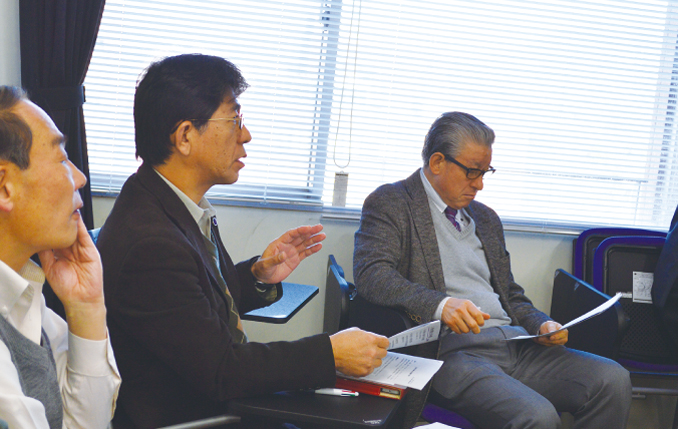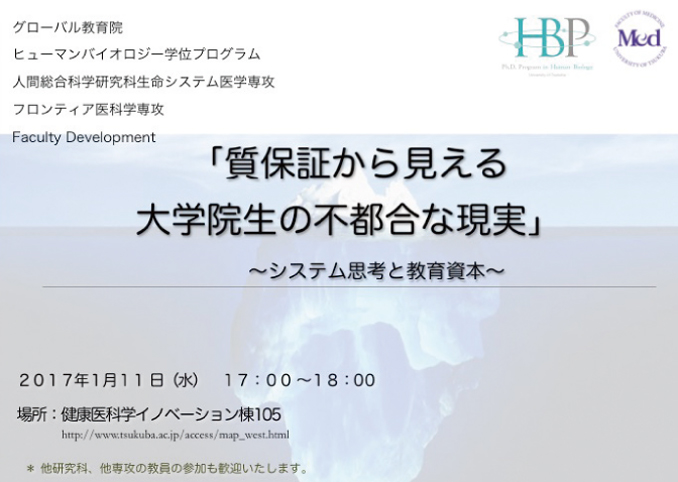Cultural difference causes different opinions to arise
Faculty development (FD) is held frequently to communicate legal revisions or necessary general information both department-wide and university-wide. In the HBP, however, we often use FD as an opportunity to share and learn from the challenges we face in setting up and managing a new program. FD is also considered an opportunity to openly discuss what we should address based on our current situation, or which directions we should take in future. FD in the standard sense focuses primarily on how to prevent problems and scandals and how to remove fear factors. In contrast, FD in the HBP creates a place to discuss underdeveloped matters, for example how to nurture students. Also, because the HBP’s staff members come from different specialized organizations in the first place, everyone’s culture is different. That causes different opinions to arise, which I find interesting.
What I noticed while working on the management of the HBP, including FD, is that each organization is a different entity with a different culture, even though all organizations belong to the University of Tsukuba. Needless to say, when working on a new initiative in the HBP, we always needed to share ideas and opinions through discussion, and to work together based on the understanding this fostered. As a result, openness among the organizations and faculty members has improved, since we did not know anything about each other in the beginning.

Interactive discussion among various faculty members
[ Faculty Development (FD) ]
FD is systematic research and training conducted by faculties to improve and enhance the quality of classes and educational methods, and It is required that each organization implement it. On the other hand, implementing FD tends to be turned into a purpose, and HBP approached to make the best use of FD opportunities systematically.
HBP leverages FD as the place where faculties learn the way of education and people development and also discuss new strategies necessary for education reforms. HBP also actively utilizes FD as an opportunity to collect information from the outside by inviting external experts.
Don't stop, Take another step toward excellence
As a teacher, I learned a lot through faculty development. For example, I found the issue of educational capital quite interesting. I became convinced that students need to have a foundation of sufficient educational capital; otherwise, they cannot develop. I expect my students to have the ability to complete a task or project, which requires a tough mentality. Simply put, they need guts or courage, which is imperative, and I guess that becomes educational capital. When you think that something is just okay, you should not stop there. You should take another step toward excellence. Consequently, thanks to this effort, a new vision will emerge. I would like students to give another try to a task or project when they come to a dead end.
However, I have observed that HBP students progress and mature through the five years of the program. The long-term overseas laboratory rotation, for instance, helps students mature; it can be considered educational capital. Strictly speaking, to be a full-fledged Ph.D., students should focus on their research with a tough mentality in addition to maturity. In fact, being mature as a person is a minimum requirement for students aiming to be a Ph.D. As in sports, students can master a skill after several years by enthusiastically tackling tough challenges.
If the program can help students acquire maturity and a tough mentality early on, they will learn more in the remaining period of the program.

Strategic use of FD for education reforms
[ The Power of ABC in HBP ]
In order to put the HBP student development goal into a concrete subject design, it was necessary to clearly define the abilities acquired through the program with fostering a common understanding among faculty members and students in the entire organization.
HBP defined the abilities as the ABC of Human Power, namely the power of accomplishment (A: Accomplishment), the power of breakthrough (B: Breakthrough), and the power of judgment (C: Cognoscente) on top of the technical ability. HBP also defined the behavioural objectives of the powers of ABC in GLidD.

